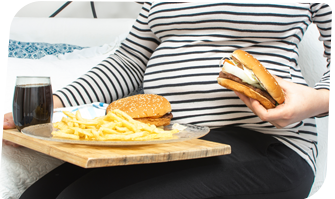
Why does heartburn start during pregnancy?
Heartburn is very common during pregnancy especially during the third trimester. Heartburn affects 22% of women in the first trimester, 39% in the second and 72% in the last. (1) This is because during pregnancy your body produces hormones that can slow down digestion and can cause the muscular valve between the oesophagus and the stomach to relax.
As a result, stomach acid is more likely to leak into the oesophagus and cause a burning pain in the chest and throat. The increasing pressure on your stomach as your baby grows can also force the acid into the oesophagus.
Don’t worry, it does not harm the baby, but it can be extremely uncomfortable. Welcome relief can be found with Rennie which can be taken during pregnancy as long as it is taken according to the instructions*.
*Medicines can affect the unborn baby. Always talk to your doctor or pharmacist before taking any medicine in pregnancy.
Heartburn Symptoms
PREGNANCY
“I really didn’t expect to get such bad heartburn when I first got pregnant. Sometimes it’s hard to carry on with the day.”
Symptoms of heartburn in pregnancy include:
- sore throat
- burp or belch
- a burning sensation in your chest or throat after eating
- a feeling of fullness or bloating
- a sour or salty tasting fluid in the back of your throat
- difficulty swallowing
HEARTBURN IN PREGNANCY TREATMENT

What can I take for heartburn during pregnancy?
You’ll be relieved to know that all Rennie products are suitable for use during pregnancy (if taken as instructed and if prolonged intake of high dosages is avoided). Rennie’s antacid-based calcium carbonate and magnesium carbonate formula acts physically rather than by entering the bloodstream, neutralising excess acid and turning it into water and other natural substances(3) that are easily evacuated by the body.
Always talk to your doctor or pharmacist before taking any medicine during pregnancy. Always read the label. If symptoms are severe or prolonged, talk to your doctor or pharmacist.
Prevention
Tips for avoiding heartburn in pregnancy (2)

How and what you eat can help keep heartburn to a minimum in pregnancy:
- Eating your meals too quickly increases the likelihood of heartburn. Try to relax and enjoy your food.
- Try eating five or six smaller meals rather than three large ones, which are hours apart, to prevent your stomach from becoming too full and pushing up under your diaphragm. If small meals don’t work for you, try to eat your main meal at lunchtime and your evening meal as early as possible. This will allow plenty of time for food to pass down through the stomach and minimise the risk of acid reflux before bedtime.
- Try to stay sitting upright after eating, as lying down can allow food and stomach acid to be regurgitated. Sleeping propped up by two or three pillows may also help in the later stages of pregnancy.
- It’s not easy, but keeping calm and avoiding stress can help keep your digestive system flowing smoothly.
- Try not to drink lots of liquid when you eat as it dilutes your digestive juices making them less effective. Instead, stay hydrated by drinking water in between meals.
- Unfortunately, even if you follow all advice on avoiding heartburn in pregnancy, you may still experience symptoms which should disappear in most women after giving birth.
References
- Vazquez J. C. (2015). Heartburn in pregnancy. BMJ clinical evidence, 2015, 1411.
- https://www.webmd.com/heartburn-gerd/guide/heartburn-during-pregnancy [Accessed on 20.10.21]
- Maton PN, Burton ME. Antacids revisited: a review of their clinical pharmacology and recommended therapeutic use. Drugs1999; 57: 855–70.
- Always read the label. If symptoms are severe or prolonged, you should consult a doctor or pharmacist. If you are pregnant, medicines can affect the unborn baby. Always talk to your doctor or pharmacist before taking any medicine during pregnancy.












